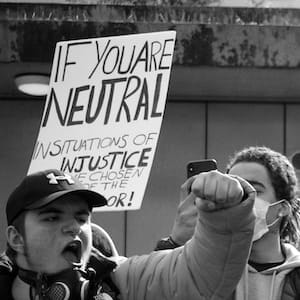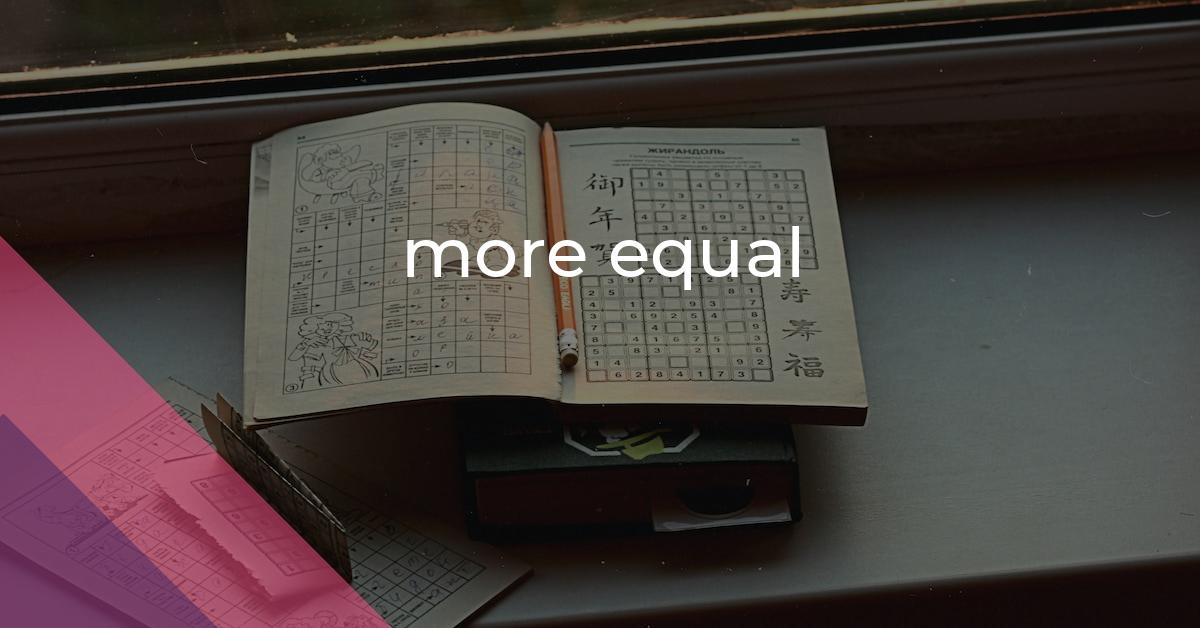more equal: Idiom Meaning and Origin
What does ‘more equal’ mean?
The idiom "more equal" means that something or someone is not considered completely equal, but is seen as having a higher level of equality compared to others.

Idiom Explorer
The idiom "to a degree" means to some extent or to a certain level. It indicates a limited or partial amount of something, often suggesting that it is not absolute or complete.
The idiom "second string" refers to a person who is not as important or skilled as someone else in a particular situation or role.
The idiom "second-rate" refers to something of inferior quality or standard compared to others in the same category.
The idiom "same difference" is used to express the idea that two things may seem different but are actually quite similar or have no significant difference.
An idiom often used to describe a person who is disliked or considered bad, with negative qualities or behavior.
The idiom "reign supreme" means to have complete control or be in a position of undisputed power or authority.
The idiom "rarer than hens' teeth" means something is extremely uncommon or scarce. This comparison refers to the fact that chickens do not have teeth, making them virtually non-existent.
An idiom used to describe someone or something that is highly unusual or unique; as rare as a rare animal.
The idiom "put on a pedestal" means to admire or worship someone or something to an excessive extent, often idealizing them and treating them as if they are perfect or infallible.
'Pull rank' is an idiom that means to use one's higher rank or position of authority to gain an advantage or to assert dominance over someone else.
Deciphering Imbalances: Unraveling "More Equal"
The idiom "more equal" is related to several idioms, each adding to the understanding and significance of the phrase. One such idiom is "first among equals," which implies that although all individuals may be considered equal, there is still a hierarchy or ranking system in place. It suggests that some individuals hold a higher position or status than others within a group or community, despite the overall equality.
Another related idiom, "a notch above," further emphasizes the idea of inequality within equality. This phrase suggests that while individuals may be considered equal, some still possess qualities or attributes that set them apart and place them slightly above the rest. It implies that there are varying degrees of equality, with some individuals being slightly superior or more advanced in certain aspects.
In addition, the idiom "more often than not" adds another layer of meaning to the concept of "more equal." This phrase suggests that although something may not occur all the time, it happens frequently or commonly enough to be considered the norm. When applied to the notion of equality, it implies that inequality and disparities are more common than we may initially think, even within the framework of equality.
Furthermore, the idiom "more than meets the eye" highlights the idea that there is often more to a situation or individual than what is initially apparent. It suggests that things are not always as they seem and that hidden complexities and inequalities may exist beneath the surface. When related to the concept of "more equal," this idiom encourages us to delve deeper and critically examine the factors that contribute to inequality, even within the framework of equality.
Lastly, the idiom "not entirely" adds a sense of nuance and qualification to the concept of "more equal." It implies that while something may be partially true or valid, it is not wholly or completely accurate. Applied to the notion of equality, this phrase suggests that although individuals may strive for equality, it is not completely achievable due to inherent factors that perpetuate inequality.
Overall, the idiom "more equal" is intricately connected to these related idioms, which further illuminate the complexities and challenges of achieving true equality. Each idiom contributes to a more nuanced understanding of the concept and reminds us that while equality may be an ideal, it is not always fully realized in practice.
Example usage
Examples of how the idiom "more equal" can be used in a sentence:
- Although all students in the class should be treated equally, some teachers believe that certain students are more equal than others.
- In some countries, social and economic disparities make it difficult for people to be considered more equal in society.
- While the law should apply to everyone equally, there are cases where powerful individuals are considered more equal in the eyes of the legal system.
More "Equality" idioms



